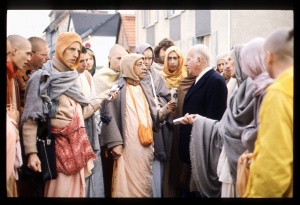SB 3.32.27

A.C. Bhaktivedanta Swami Prabhupada
TEXT 27
- etāvān eva yogena
- samagreṇeha yoginaḥ
- yujyate 'bhimato hy artho
- yad asaṅgas tu kṛtsnaśaḥ
SYNONYMS
etāvān — of such a measure; eva — just; yogena — by yoga practice; samagreṇa — all; iha — in this world; yoginaḥ — of the yogī; yujyate — is achieved; abhimataḥ — desired; hi — certainly; arthaḥ — purpose; yat — which; asaṅgaḥ — detachment; tu — indeed; kṛtsnaśaḥ — completely.
TRANSLATION
The greatest common understanding for all yogīs is complete detachment from matter, which can be achieved by different kinds of yoga.
PURPORT
There are three kinds of yoga, namely bhakti-yoga, jñāna-yoga and aṣṭāṅga-yoga. Devotees, jñānīs and yogīs all try to get out of the material entanglement. The jñānīs try to detach their sensual activities from material engagement. The jñāna-yogī thinks that matter is false and that Brahman is truth; he tries, therefore, by cultivation of knowledge, to detach the senses from material enjoyment. The aṣṭāṅga-yogīs also try to control the senses. The devotees, however, try to engage the senses in the service of the Lord. Therefore it appears that the activities of the bhaktas, devotees, are better than those of the jñānīs and yogīs. The mystic yogīs simply try to control the senses by practicing the eight divisions of yoga-yama, niyama, āsana prāṇāyāma, pratyāhāra, etc.—and the jñānīs try by mental reasoning to understand that sense enjoyment is false. But the easiest and most direct process is to engage the senses in the service of the Lord.
The purpose of all yoga is to detach one's sense activities from this material world. The final aims, however, are different. Jñānīs want to become one with the Brahman effulgence, yogīs want to realize Paramātmā, and devotees want to develop Kṛṣṇa consciousness and transcendental loving service to the Lord. That loving service is the perfect stage of sense control. The senses are actually active symptoms of life, and they cannot be stopped. They can be detached only if there is superior engagement. As it is confirmed in Bhagavad-gītā, paraṁ dṛṣṭvā nivartate: (BG 2.59) the activities of the senses can be stopped if they are given superior engagements. The supreme engagement is engagement of the senses in the service of the Lord. That is the purpose of all yoga.